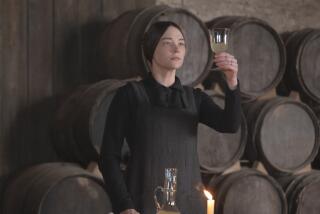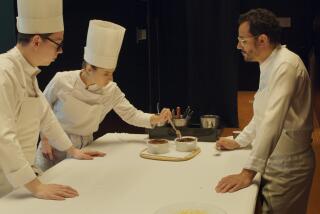Market Scene : French Liquor Scion Prospers by Striking Out on His Own : Andre Cointreau cooks up new profits from century-old Cordon Bleu school.
- Share via
PARIS — Had he been born with a different last name, Andre Cointreau muses, “I’d probably be more relaxed. I imagine I’d be a teacher. I love teaching.”
But as the scion of two eminent French clans--Cointreau of Angers and Remy Martin of Cognac--and a man raised, as he explains, “in a ‘spirits’ environment,” that wasn’t an option.
“On the one hand, the family name opened doors,” Cointreau said. “You’re not in the anonymous crowd when you’re a Cointreau. But, on the other, you probably have to prove yourself more if you want to play the game.”
The game is business, and Andre J. Cointreau, at age 47, has proven himself. In 1984, with the Cointreau-Remy Martin clans locked in a bitter struggle for control of the family firm, Andre Cointreau struck out on his own, buying the renowned Cordon Bleu cooking school from its aging director, Elizabeth Brassart, a longtime family friend.
Now, just over a decade later, Cointreau has turned Cordon Bleu from a respected classical cooking school into the world’s premier culinary institution. He has branches in London and Tokyo, and has moved the Paris operation to a new and larger building. He’s added Michelin-starred chefs to his coterie of 26 expert teachers. And, last year, Cordon Bleu revenues grew 30%.
To round out his devotion to the art de vivre , he bought Pierre Deux, which sells home furnishings from the French countryside, in 1993. Sales soared 40% last year at the division’s eight stores. Now he plans to open one more--on Rodeo Drive--next year.
“It’s not the Cointreau name,” one Cordon Bleu executive said. “Mr. Cointreau has done it all by himself.”
Cointreau demurs, French bourgeoisie manners on display. “You Americans tend to overemphasize the people behind the scenes,” he said. “But I am very European. We believe that we are all at the service of the institutions, which will be here long after we’re gone. We’re just here to pass the torch.”
Passing the torch is a key feature of the strongest of French companies, from the Michelin tire giant to the Rothschild winemaker. And while Andre Cointreau embraces that tradition, his style of operating is hardly stodgy. With Cordon Bleu, he has moved quickly, decisively and boldly, like an American entrepreneur.
Although he is as urbane as his gray-haired forebears, Andre Cointreau gives the impression of a young man having fun. Friendly and down-to-earth, this small, slim dark-haired Frenchman is as at home in New Orleans, Louisiana, as in Orleans, France.
Of course, no one can doubt that family ties have been important. He was born, the second of seven children, to Max and Genevieve Cointreau. His father was from the Cointreau liqueur family and his mother was one of two daughters of Andre Renaud, a descendant of the Remy Martin firm of cognacs and wines, which was formed in 1724.
Andre Cointreau spent the first 11 years of his life on the family estate in Cognac before the family moved to Paris. It was an haute bourgeoisie life, with English nannies, vacations in the family getaway in the Loire Valley and a cook in each of three homes.
His mother’s side of the family was French through and through. His father had mixed ancestry. Andre’s paternal grandfather was French, an officer during World War I, a member of the French congress in 1932. But his grandmother was a Scot.
“We lived in two worlds,” he said. “The British approach and the French approach are absolutely irreconcilable. There is a very strong, genuine and civilized British way. And there is a very strong, genuine and civilized French way. But there’s no middle ground.”
His Scottish grandmother prevailed most of the time, which helps explain why Andre Cointreau speaks English fluently with an upper-class British accent.
Cointreau studied politics and economics and graduated from France’s prestigious business management school, Hautes Etudes Commerciales (HEC), which produces most of the country’s chief executives. “Being a Cointreau is one thing,” he said, “but in France it’s more important to be HEC than Cointreau. We are crazy about diplomas. After that, of course, it’s ‘Give me a balance sheet and I’ll tell you who you are.’ ”
He started out in a variety of marketing and finance jobs, with Lever Bros., American Express and eventually the Cointreau Liqueur Co., before buying Cordon Bleu. His wife, Hedwidge Cointreau de Bouteville is the mother of their four children, ages 5 to 13, and runs the Pierre Deux stores. Today, they have homes in New York, London, Paris and Angers.
Cointreau describes his work as “more like a vacation than anything else,” but he travels widely, sits on several boards of directors and has breathed new life into the Cordon Bleu school, which was founded a century ago.
“In some ways, we’re a start-up company that is 100 years old,” he said.
He described the decision to buy the school as a choice between remaining comfortably in the family business or testing himself in the real world. “I asked myself, ‘Do you want to lay back and enjoy, or risk problems and failure but also reward?’ ” he said. “I chose the risk.”
Now the only question is whether Cordon Bleu will be passed down to the next generation. “We’ll see,” Cointreau said, “but it’s up to my children to decide.”
Cointreau did send the children to school for four years in London, where Cordon Bleu’s holding companies are based, “so they would understand the British at a young age,” he explained. “I don’t know if it worked, but they understand cricket a lot better than I do.”
Cointreau’s own brothers and sisters are involved in a variety of businesses, which he declines to discuss, in the French way, asking for “discretion.” Still, he says the family remains very close, and a reunion is planned this Christmas at the South African estate of one of his sisters, who owns a vineyard in Stellenbosch.
Cointreau is philosophical about the family quarrel that landed the Cointreau and Remy Martin clans in French courts for 10 years. During a recent interview, he referred to it as “a family shuffle of the cards.” Later he said: “Let’s just call it ‘the family talks.’ ”
Quarrel or talks, it was ugly. More than 30 lawsuits were filed, creating a mass of litigation so confusing that, as the Paris daily Le Monde reported at the time, “no one, not even the interested parties, understands what’s going on anymore.”
The suits were settled, though, in 1990, and the Remy Martin descendants, led by Andre Cointreau’s cousin, Andre Heriard Dubreuil, now own a controlling interest in a firm called Remy Cointreau. The company, which owns Remy Martin among other subsidiaries, is one of the world’s leading makers of fine-quality cognac, spirits, champagne and wine, with annual sales of $1.2 billion.
Andre Cointreau’s uncles, on his father’s side, retained an interest in the company. Cointreau’s father, Max, sold his shares and now oversees a variety of businesses, including the largest estate producing top cognac-quality grapes in the tiny Cognac region of west-central France.
Looking back, Andre Cointreau believes the split was inevitable. But, he points out, the families did build a great company before their falling out.
“Five generations were in that business,” he said, “and it’s always a fragile equilibrium, from generation to generation. What are the odds that you can be brilliant for five generations. I mean, what a breed!”
Family control of companies for generations is, in Cointreau’s view, what sets France apart from other free-market countries. “You need several generations to build a major success,” he said.
“That’s a weakness in America. Your general managers are analyzed and rewarded on nine-month profits. It’s nice to have one, two or even three generations to really achieve long-term development.”
He paused. “See how French I am?” he said, laughing. “Everything for us comes down to philosophy.”
More to Read
Eat your way across L.A.
Get our weekly Tasting Notes newsletter for reviews, news and more.
You may occasionally receive promotional content from the Los Angeles Times.











